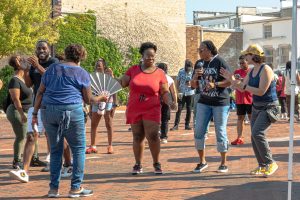‘Committed life’ of King honored
January 23, 1991
Rev. Martin Luther King Jr.‘s contribution to the civil rights movement was foremost in the minds of about 300 people gathered at a service in his honor Tuesday night.
Student and campus leaders spoke of King’s achievements to an enthusiastic crowd in the Holmes Student Center’s Capitol Room.
“His cause was just but his death wasn’t,” Black Student Union President Vanessa Malone said of the leader who was assassinated by James Earl Ray on April 4, 1968.
“He sought truth and he led a committed life,” said Barbara Henley, vice president for Student Affairs.
Malone reminded the crowd that the fight against racism was not new and that students must look to themselves to continue it.
“There are many leaders among us—male and female,” she said.
The service was sponsored by the Delta Sigma Theta sorority. The sorority members and eight speakers all lit one of 22 candles symbolizing the 22 years since King’s death.
King was a “middle-of-the-road man,” said sorority member Kimberly Hines. He saw practicing non-violence as the way to overcome injustice, instead of practicing either apathy or violence as others did, she said.
Hines said the memorial, a first annual tribute to King, was not meant to mourn him but to talk about his contributions to society.
“As we think of Dr. King tonight we must think of his accomplishments” and renew our dedication to his ideals, said NIU President John La Tourette.
La Tourette listed King’s most important achievements as having challenged the status quo opinion of blacks in society, giving hope to black Americans and influencing civil rights legislation.
“As faculty and staff we must work harder for equality,” he said. “As students you must make the most of your educational opportunity to carry on King’s legacy.”
More than 30 members of the NIU Black Choir performed songs in King’s honor. And four members of the Black Theatre Workshop acted out a scene from the play, “Dreaming of the Palace.”
Student Association President Robert McCormack asked the crowd “Would anyone be willing to die for an ideal?”
King was willing to risk everything, even his life for what he believed in, McCormack said.
The service ended with the audience standing and singing the “anthem,” “We Shall Overcome” along with the choir.






